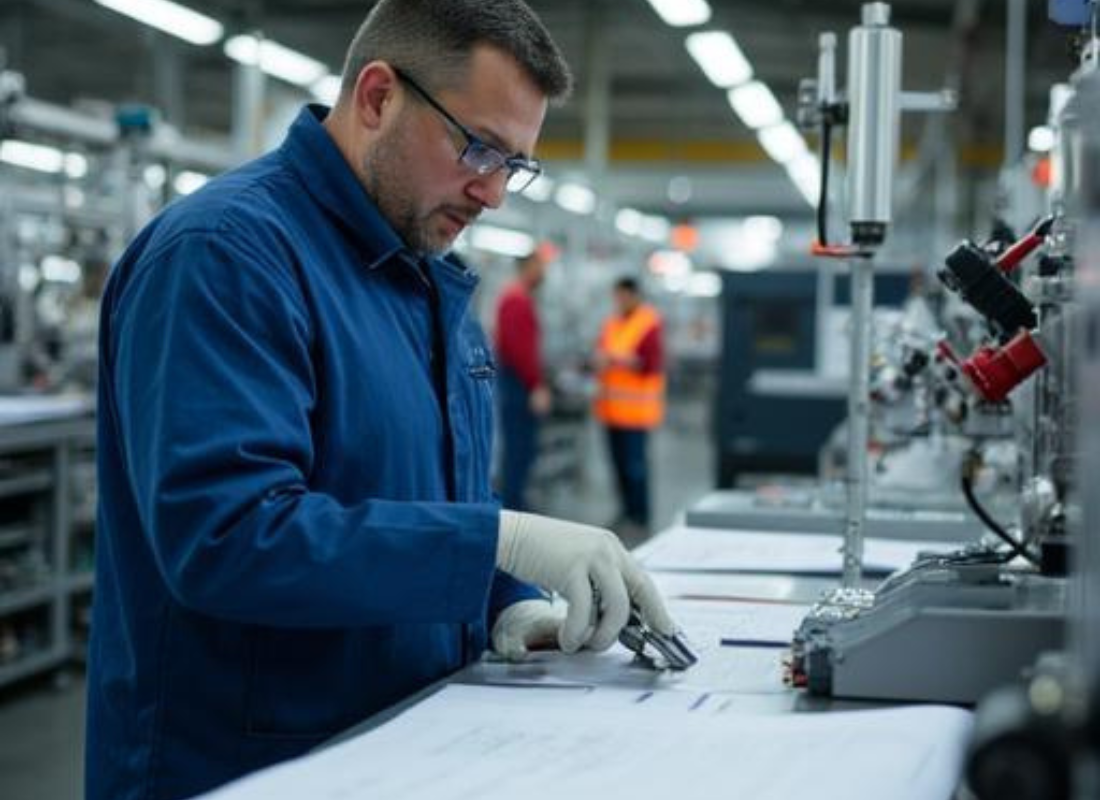Sales Tax Exemption for Manufacturing: What Leaders Need to Know
Originally published on October 17, 2025
Here’s something worth paying attention to. In Florida, qualifying manufacturers can save 6% or more on each equipment purchase through the state’s sales tax exemption. Yet many businesses overlook these savings or fail to maintain the required documentation. As a result, they leave real money on the table year after year.
If you lead or manage a manufacturing business, this sales tax exemption can directly improve your margins and cash flow. These savings can be redirected to capital upgrades, hiring or R&D. But to benefit, you need to understand what qualifies, how to claim the exemption and what documentation is necessary.
Understanding the sales tax exemption for manufacturing
Most states provide sales tax exemptions for manufacturers that purchase qualifying machinery, equipment and (occasionally) raw materials used in the production process. These exemptions are designed to support industrial growth by lowering the tax burden for companies making capital investments.
In Florida, a full exemption applies to the purchase of industrial machinery and equipment used at a fixed location by a business with a primary activity listed under NAICS codes 31 through 33. This includes machinery that cuts, assembles, molds or otherwise converts raw materials into finished goods.
On a national scale, these exemptions are just as critical. The Annual Survey of Manufactures found that over 60% of capital expenditures by manufacturers are potentially eligible for sales tax relief. That means a majority of investments made by manufacturing firms could benefit from exemptions, but only if the purchases and usage are correctly documented and compliant.
That compliance piece is key. Most state exemptions apply only to equipment used directly in the manufacturing process. For example, forklifts, security systems and administrative software may be denied unless they are integral to production. Misunderstanding these boundaries often leads to denied claims or costly audit adjustments.
Eligibility requirements for manufacturers
Sales tax exemptions for manufacturing are not one size fits all. The requirements for Florida’s exemption on industrial machinery and equipment are outlined in Florida law under Statute 212.08. It states the manufacturer must:
- Operate a business classified under NAICS codes 31 through 33
- Use the machinery exclusively at a fixed location within Florida
- Ensure the equipment is used at least 50% of the time for manufacturing activities
- Certify the purchase at the point of sale using Form DR-1214 (this form serves as the Sales and Use Tax Exemption Certificate)
In addition to these basic criteria, the equipment must be directly used in the manufacturing process and have a useful life of at least one year. This excludes items like office equipment, shelving and tools used for facility maintenance, even though they may support operations more broadly.
Some states offer partial exemptions or tiered benefits depending on how the equipment is used. For example, in Texas, equipment that is only partially used in manufacturing may qualify for a prorated exemption. In California, manufacturers must track energy consumption levels for certain machinery to prove that the majority of use is related to production.
These nuances make it critical to document how each piece of equipment is used, not just what was purchased. States often require usage logs or production reports to verify compliance during an audit.
For Florida-based manufacturers, the best starting point is reviewing the guidance offered by the Florida Department of Revenue along with support from a qualified tax professional. At James Moore, our manufacturing industry services team works closely with clients to determine exemption eligibility based on both state rules and real-world operations.
Required documentation and compliance tips
Claiming a sales tax exemption is not as simple as checking a box. It requires accurate, consistent documentation that supports how the equipment is used. Without the right paperwork, a valid exemption can be reversed during an audit, resulting in back taxes, penalties and interest.
At the time of purchase, manufacturers must provide the seller with a completed and signed Form DR-1214 to certify the purchased items are intended for exempt use. It must be issued before or at the time of the sale; retroactive certificates are generally not accepted.
In addition to the certificate itself, manufacturers should maintain the following records:
- A detailed description of the equipment purchased
- Purchase invoices that match the exemption certificate
- Proof that the equipment is used at least 50% in manufacturing
- Maintenance and usage logs
- Annual review of all exemption certificates on file
The Florida Department of Revenue recommends keeping these records for at least five years. Auditors may request this documentation to verify that the claimed exemption was valid at the time of purchase and that it remains applicable.
For multistate manufacturers, managing documentation across different jurisdictions is crucial. Some states require periodic renewal of exemption certificates. Others require different forms for different types of equipment. Missing a single deadline or using the wrong certificate can trigger compliance issues even if the purchase itself was legitimate.
We frequently work with clients to audit their exemption certificate records before state agencies do. We help identify missing forms, ensure correct usage classification and streamline the recordkeeping process to reduce audit exposure. This proactive approach helps protect the savings manufacturers gain from these exemptions.
Common misconceptions and costly mistakes
Sales tax exemptions can offer real savings, but misunderstandings often lead to costly errors. One of the most common misconceptions among manufacturers is the belief that any purchase related to operations qualifies for exemption. That assumption can backfire quickly during a state audit.
As stated earlier, Florida only allows machinery and equipment used directly in the manufacturing process for exemption. That does not include items such as:
- Storage racking used outside the production area
- Computers used solely for administrative tasks
- Forklifts used for general warehouse operations
- Office furniture or HVAC systems
Each of these items may be essential to business operations but does not meet the narrow definition required for sales tax exemption under Florida Statute 212.08. Misclassifying these purchases can result in assessments of back taxes, penalties and interest. Additionally, once a pattern of misclassification is identified, auditors may expand their review period, increasing financial risk.
Another common mistake involves reusing outdated exemption certificates. Florida’s Form DR-1214 must be accurate and applicable to the current purchase. Using a generic certificate that fails to identify the specific use or NAICS classification could be grounds for denial.
We also see issues when companies acquire used equipment or purchase from out-of-state vendors. These transactions often fall into gray areas where standard exemption procedures may not apply. Manufacturers might not realize they need additional documentation or a separate exemption process for such purchases.
This is where working with professionals familiar with Florida’s state and local tax requirements can make a difference. The state and local tax (SALT) services team at James Moore helps clients avoid these pitfalls by reviewing purchase records, updating exemption forms, and providing education to internal procurement teams. Proactive compliance planning reduces audit exposure and protects your bottom line.
Opportunities for savings through proactive tax planning
Sales tax exemptions are only one part of a broader tax strategy for manufacturers. Businesses that incorporate exemption planning into their overall tax structure often uncover additional savings opportunities that go unnoticed by those taking a reactive approach.
By combining sales tax planning with capital budgeting, manufacturers can time equipment purchases in a way that maximizes benefit. For example, bundling exempt purchases during a period of significant capital expansion can simplify documentation and align with broader investment incentives at the state level.
Many states also offer additional incentives or partial exemptions on energy use, pollution control equipment, R&D investments and materials used in prototype development. These programs are sometimes overlooked because they’re housed under separate economic development or environmental regulatory agencies. Cross-checking these opportunities as part of annual tax planning can produce substantial savings.
Several states have expanded their exemptions in recent years to stay competitive and attract industrial investment. Florida remains among the more favorable states, but businesses must stay informed to ensure they are taking advantage of any rule changes or new guidance.
Proper documentation, regular reviews of exemption usage, and staff training are key components of an effective plan. At James Moore, we encourage our manufacturing clients to integrate sales tax considerations into broader tax reviews. We help identify where exemptions are being underutilized, assess the risk of current practices, and map out steps for stronger compliance and savings. Doing so helps manufacturers reinvest in their operations, improve profitability, and gain a stronger foothold in a competitive market.
Sales tax exemption for manufacturing: A smarter way to reduce overhead
For manufacturing leaders, sales tax exemptions represent a real and repeatable opportunity to reduce costs and improve financial performance. Those who take the time to align their operations with current exemption laws reduce tax exposure and create more room for reinvestment and strategic growth.
If your business is purchasing machinery, expanding production or planning a facility upgrade, now is the time to revisit your sales tax strategy. Even a small oversight can lead to large penalties if not addressed early.
Contact a James Moore professional to evaluate your current exemption process, identify potential savings, and ensure your documentation stands up to audit scrutiny. Our team brings years of experience helping manufacturers stay compliant while maximizing every dollar saved.
All content provided in this article is for informational purposes only. Matters discussed in this article are subject to change. For up-to-date information on this subject, please contact a James Moore professional. James Moore will not be held responsible for any claim, loss, damage, or inconvenience caused as a result of any information within these pages or any information accessed through this site.
Other Posts You Might Like




